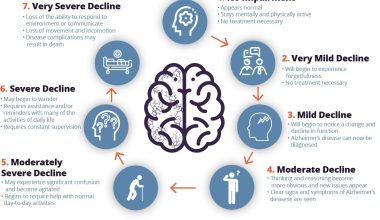As an Amazon Associate, I earn from qualifying purchases
As of 2021, approximately 850,000 people live with dementia in the UK. This number is projected to rise to over 1 million by 2025.
Dementia presents a significant public health challenge in the United Kingdom, affecting a vast population across the country. This progressive condition, which includes Alzheimer’s disease as its most common form, leads to the deterioration of cognitive functions. The rising numbers reflect an aging population, where dementia primarily affects individuals over 65, though it can also occur in younger people, known as early-onset dementia.
The impact of dementia on the healthcare system, families, and caregivers is profound, necessitating continuous research, support infrastructures, and significant medical attention to manage the growing numbers. Understanding these statistics is crucial for planning effective healthcare services and providing support to those affected by the condition.
Page Contents
ToggleRising Trends In Dementia
Dementia cases in the UK are on the upswing, shaping public health priorities and necessitating a deeper understanding of its demographic distribution. Detailed statistics elucidate this upward trajectory, revealing critical patterns across different segments of the population. Unpacking these patterns helps in tailoring strategies to curb this concerning rise.
Age Group Analysis
Age remains the most significant risk factor for dementia, with distinct increases across senior age brackets. The following illustrates the prevalence among different age groups:
| Age Group | Prevalence |
|---|---|
| 65-69 | 2% |
| 70-79 | 5% |
| 80+ | 20% |
Gender And Dementia Prevalence
Women are disproportionately affected by dementia. Comparing males and females in the same age categories shows higher prevalence rates among women. Notable numbers include:
- 65+ years old – Women are twice as likely to develop dementia compared to men
- Lifetime risk – One in five women will develop dementia vs one in ten men
These statistics highlight the importance of gender-specific research and targeted interventions. Public health policies must accommodate these disparities to effectively address the growing dementia challenge.

Credit: www.alzheimersresearchuk.org
Geographical Variations In Dementia Cases
Understanding where dementia cases are most common helps us support affected communities. UK data shows dementia does not affect every area equally. Regional differences provide insights for healthcare planning and support services.
Regional Hotspots
In the UK, dementia cases cluster in certain regions. These ‘hotspots’ show higher rates of diagnosis. North East England and Wales report the most cases. Cities like Newcastle have large elderly populations, explaining higher dementia numbers.
Urban Vs Rural: Diverging Patterns
Urban and rural areas show different dementia patterns. Cities often see higher diagnosis rates. This is due to better access to medical services. Rural areas face challenges like fewer doctors and longer travel for care. Consequently, rural dementia may be underreported.
| Area Type | Number of Cases | Healthcare Access |
|---|---|---|
| Urban | Increased | Better |
| Rural | Possibly Underreported | Limited |
Differences in dementia statistics across the UK require targeted approaches. By focusing on regional and urban-rural variations, healthcare providers can develop tailored strategies to combat dementia.
Impact Of Lifestyle On Dementia Rates
The impact of lifestyle on dementia rates is a subject gaining significant attention. With dementia statistics in the UK on the rise, understanding how daily habits can influence the likelihood of developing this condition is vital. Lifestyle choices, such as diet and physical activity, are key factors that can either increase or reduce the risk of dementia.
Diet And Nutrition Correlations
A balanced diet plays a crucial role in maintaining brain health. Research indicates that certain nutrients can potentially prevent cognitive decline. Here are key dietary components linked to better brain health:
- Antioxidants: Consuming a diet rich in antioxidants can help protect the brain from damage.
- Omega-3 fatty acids: These are found in fish and have been shown to slow cognitive decline.
- Vitamins E and D: These vitamins support brain function and may lower dementia risk.
A Mediterranean diet, high in fruits, vegetables, and healthy fats, is often recommended for its positive impact on brain health. The table below showcases the diet elements and their potential effect on reducing dementia risk.
| Dietary Element | Potential Effect on Dementia Risk |
|---|---|
| Leafy Greens | May lower risk |
| Berries | Helps in slowing cognitive decline |
| Nuts | Supports brain health |
| Whole Grains | Improves overall cognitive health |
Exercise And Cognitive Health Links
Regular exercise is not only good for the heart but also the brain. Staying physically active improves blood flow and can increase brain cell growth. The links between exercise and cognitive health include:
- Enhanced memory: Exercise is known to boost memory function.
- Reduced inflammation: Physical activity can reduce inflammation and support healthy brain cells.
- Increased brain volume: Some studies suggest exercise can increase the size of brain areas related to memory.
An active lifestyle that incorporates various forms of exercise, like walking, cycling, or swimming, is advisable. Aim for at least 150 minutes of moderate activity per week for the best results in cognitive health maintenance.

Credit: www.news-medical.net
Economic Burden Of Dementia
Dementia stands as a significant challenge, not just in health terms but economically. It demands hefty costs from the healthcare system and affects workforce productivity. In the UK, dementia levies a substantial economic toll affecting individuals, families, and society as a whole.
Healthcare Costs Analysis
The financial demands of dementia care are immense. Costs include hospital stays, medications, and long-term care needs. Families often bear a significant portion of these costs personally. The following points lay out key financial strains:
- Direct Medical Costs: These encompass GP visits, specialist consultations, and hospital admissions.
- Long-term Care Costs: Costs for residential and nursing home placements escalate annually.
- Personal Expense: Many families face out-of-pocket expenses for care support products and modifications to the living space.
NHS and social care services allocate a substantial budget to dementia, but these funds seldom cover all required care aspects, leaving gaps filled by personal finances.
Productivity Losses And Social Impacts
Dementia extends its economic impact beyond healthcare, affecting workforce productivity and social structures. Caregivers often reduce work hours or leave employment to provide the necessary care, leading to:
- Reduced Earnings for families and individuals, placing them at risk of financial instability.
- Lost Tax Revenue for the government due to decreased workforce participation.
- Increased Welfare Needs as families affected by dementia may lean more on social support systems.
This ripple effect touches communities, heightening the need for comprehensive policies and support systems to alleviate the social and economic burdens of dementia.
Advancements In Dementia Research
The landscape of Dementia research in the UK is ever-evolving. As scientists push the boundaries of what we know, they shine a light of hope for millions. Careful investigation and innovation lead to notable advances in treatment and prevention. Let’s explore the latest breakthroughs that could change the way we approach this condition.
Breakthrough Treatments And Trials
Exciting new therapies are on the horizon in the UK, thanks to groundbreaking research. Scientists focus on treatments that could slow or even halt dementia’s progression. Here are some recent highlights:
- New drugs aim to target dementia symptoms. They improve memory and cognitive functions.
- Ongoing clinical trials test these drugs’ effectiveness. They enroll volunteers from diverse backgrounds.
- Gene therapy’s potential grows. It might correct genetic risks linked to dementia.
Early Detection And Preventative Measures
Stopping dementia early is a top priority. UK research teams have made strides in early diagnosis. The benefits are clear:
- Better screening tools spot dementia signs before symptoms appear. This allows for quicker action.
- Lifestyle changes can lower risk. Balanced diets and regular exercise help in prevention.
- Educational programs spread awareness. They teach people about risk factors and healthy habits.

Credit: www.facebook.com
Frequently Asked Questions Of Dementia Statistics Uk
What Percentage Of Over 65 Have Dementia Uk?
Around 7. 1% of people over 65 in the UK have dementia. This figure represents the prevalence of dementia within this age group.
Why Is Dementia Rate So High In Uk?
Dementia rates in the UK are high due to an aging population, lifestyle factors, and improved diagnosis. Advances in healthcare contribute to longer lifespans, increasing the number of individuals at risk.
What Is The Number One Trigger For Dementia Behavior?
The primary trigger for dementia-related behaviors is often stress or discomfort. Changes in environment, routine disruptions, and physical ailments can significantly impact behavior.
Conclusion
Understanding dementia statistics in the UK provides critical insight into the growing challenges we face. It highlights the urgent need for enhanced care, support, and research funding. Let’s work together to address this public health priority, ensuring a better quality of life for those affected and their families.
Commitment and action can indeed make a difference.
As an Amazon Associate, I earn from qualifying purchases






